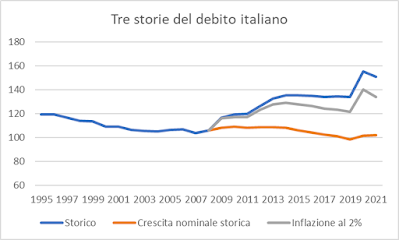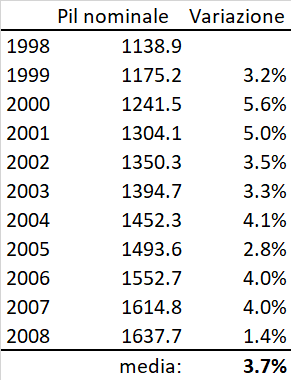Pay us the damages!
(… today I'm going to L'Aquila, there's the oath of the finance non-commissioned officer course, I'm a man of the 20th century, I was in the military, and I respect the institutions, therefore, when I can, I assure my presence. I try to reassure you here too. I'm making an effort to give continuity to our discussion: the enemy is always the same – the one who attacks us, because we don't make our own enemies: they are looking for us! – but we must all have the intelligence to understand that the trench cannot be the same: the previous one was flattened by an unprecedented bombardment and above all by something that has always been evident here, but which, for some strange reason, a third of Italians did not understand, because he wasn't interested in understanding it: the betrayal of the orthoptera. We have to come to terms with it and we have to practice what we have always preached: estote ergo prudentes sicut Serpentes et simplices sicut columbae . Trumpet rings – to talk about a friend, a regular visitor of our conferences where he came to buy ideas – or guittology seizures, do not exactly go in that direction. The advantage for us is that unlike the orthopter project, whose media firepower relied on private companies whose genesis and business model I have never fully understood, nor do I know if they still exist, the "project " zerovirgolist is based only on repeating out of time and with a clucking voice the exact same things that have been said here in time and with the thundering voice of the data – that voice that a brass masters with less agility than an economist. It is therefore not worthwhile to warn men of good will against the threat of #semomijoni, not only because it was useless anyway to warn them of the – real – danger posed by Orthoptera, but also because this threat is not such: it erodes, perhaps imperceptibly, the electoral base, consigning some suckers to the swamp of abstention, but, as the facts have shown – and this too you were told! – does not cross the threshold, is not able to express, on the political chessboard, I am not saying a bishop, but not even a pawn of the "pure and uncorrupted sacred ideal" that would win everything and convince everyone – in the fake narration of the #semomijoni . Fake narrative because – alas! – as convinced as we too may be of our reasons, the majority of Italians have their heads elsewhere, and it is because this has not entered our heads that – unfortunately – it has entered elsewhere. We have to admit it: to be a majority you need televisions, and to have televisions, or at least try to have them, you need to be a majority, and be so for a long time. I won't go into the merits of other obvious considerations: the idea that "we start with a parliamentarian, then we will grow because he will tell the truth and everyone will follow us until we obtain a majority of 51%!" I believe that whoever is here can appreciate it within its obvious limits, given the work we do to keep you updated on the concreteness of parliamentary dynamics. Here, by now, you should have understood that only a party with at least 10% can have enough speaking time and enough staff to preside over all the critical tables, oppose the main filth, and denounce them in the courtroom! He says: but you have 8%! No, dears: we have 66/400 = 16.5% – that is 17% if rounded to the nearest integer – in Parliament . And this too should make it clear to those who onanistically scatter the seed of their vote in a thousand trickles: this exercise is sterile, it can at most give birth to a more or less folkloristic character who alone should hold all the Commissions, failing to oversee them. not even one, instead of going to integrate into a structure that thanks to its technicians manages to amplify the consensus obtained in the polls to such an extent on the parliamentary seats. In other words: you may or may not like Calderoli – the blog that doesn't exist is not a party organ and speaks to a community that doesn't exist, so it can be fair-minded! – but my point is that if the zerovirgolists had one, from Calderoli – and they can't have it! – at most they would be able to increase their presence in Parliament from one to two. Zero control power, zero interdiction power, three minutes speaking time in the explanation of vote. Do you want this? Is the concept clear? So, getting to the point and concluding this premise: if they don't count a club, why talk about it? Certainly not because the mud sprinkles with which they childishly try to tarnish our image hoping to derive indirect benefit from it can draw us: in this regard, I do not understand the indignant reactions of many of you to the defamatory utterances of the methane bubbles in the Twitter swamp! Certainly not so that we can look together for the key to recovering a consensus that doesn't exist: zero point mijoni (true) would be needed to arrive at constructing a true percentage point, something perceptible, I don't think an effort in this direction is worth the worth doing it starting from non-existent bases! The meaning is another: seeing how failures think can help us avoid another failure. Exchanging likes on Twitter for votes, parroting other people's words, narrowing rather than widening the recipients of one's message: we owe and can avoid these three pillars of zero-virgo thinking. So let's go ahead and… dig! …)
There is a graph presented at #midtermgoofy that is worth repeating and illustrating here: this one
The blue broken line describes the historical trend of the debt/GDP ratio, including the last surge during the pandemic, with a rapid downward rebound. The orange and gray lines describe two counterfactuals: what if?
Let's start with the orange line. The counterfactual described is the trajectory that the debt/GDP ratio would have followed from 2009 to today if the growth rate of nominal GDP (i.e. at current prices, including the effect of inflation) had settled on the 1999-2008 average, equal at 3.7%:
A non-stellar growth rate, lower than the 5% implicit in the Maastricht parameters (the technical explanation is here ), but still three points higher than what we have had since 2009 due to austerity policies:
So, starting from 1,637 billion in 2008, if it had maintained a growth rate of 3.7%, today's nominal GDP would be 2,628 instead of 1,775 billion euros.
Consequently, imagining the same debt trajectory, the debt-to-GDP ratio today would be much, much lower:
The "historical ratio" column (understood: debt/GDP) corresponds to the blue broken line of the graph, the "counterfactual ratio" column to the orange one, and the summary is that practically all the increase in the debt/GDP ratio from 2009 to today is due to a denominator effect (the destruction of GDP due to austerity).
I am very grateful in advance to anyone who will come and explain to the author of this , this or this the methodological limits of a simulation of this type, which, moreover, is not my bag, but was presented by a Bank of Italy official at a closed-door seminar. It is sufficiently clear to me (and probably it was also to the Bank of Italy official) that altering the growth path of the GDP considering that of the debt exogenous is an accounting exercise, rather than an economic one. But in the meantime it helps us reason on orders of magnitude, and then it has its own plausibility, based on the fact that the 2009-2021 counterfactual path is basically a cousin of the 1995-2008 historical path: also from 1995 to 2008 the debt/GDP ratio was been decreasing at the rate of about one percentage point per year (from 119% to 106%), just as in the counterfactual 2009-2021 it decreased from 106% to 101%.
What do these two scenarios (the historical 1995-2008 and the counterfactual 2009-2021) have in common?
Simple: the absence of austerity policies.
It is not impossible to argue in a more refined way, if you wish, that it was austerity, i.e. the slavish adherence to the European "rules", that damaged us by bringing our debt/GDP ratio to worrying levels. Faced with this, now that everyone recognizes that the rules are wrong (and therefore implicitly admit that they have harmed someone: us), I don't see why not ask that this be taken into account.
I was talking about it with a French parliamentarian colleague, who said to me: "But then would you like to ask for damages?". And my answer was very simple: "Claiming war damages from Germany has never brought luck. However, given that the new rules provide for unfavorable treatment for those with a high debt/GDP ratio, given that we have a we have high debt/GDP due to the old rules, given that historical data show that if left alone we manage to put the debt/GDP ratio on a downward trajectory, perhaps it would not be absurd to ask that in the first seven-year cycle of application of the rules our country was not considered among those at high risk of sustainability and was allowed a softer return".
It will not surprise you to know that the French colleague was positively interested, because this was said to him in passable French, but above all, obviously, because, as you know, this problem also and above all concerns them…
(… happy Sunday! I will spend it on Sky with my partner Camusso… )
This is a machine translation of a post (in Italian) written by Alberto Bagnai and published on Goofynomics at the URL https://goofynomics.blogspot.com/2023/04/pagateci-i-danni.html on Sat, 29 Apr 2023 09:56:00 +0000. Some rights reserved under CC BY-NC-ND 3.0 license.




